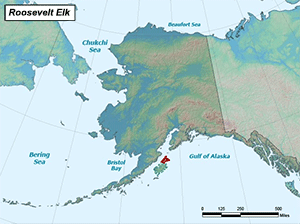About Roosevelt Elk
Description
Elk are the second largest species of deer in Alaska after moose. Males have the more traditional deer antler with a long rear sweeping branch with smaller tines off shooting and not palms like moose. Elk have a light brown-tan coat, with darker brown neck and head, and a near white-cream colored rump. They can grow to over 700lbs (325 kg)and stand up to 5ft (1.5m) tall.
Diet & Habitat
Elk are herbivores which graze primarily for food, but also browse when grazing isn't as plentiful.
Roosevelt elk were transplanted to Afognak Island from Washington's Olympic Peninsula in 1929. Since then they have also taken up residency on Raspberry Island and Little Raspberry Island and other smaller islands of the archipelago. The population in the area is roughly around 1,000 elk, but the population fluctuates.
Factors of herd size include; starvation by weather or overpopulation, bear predation, hunting, disease, natural low birth rate when herd grows too large.
Roosevelt Elk Habitat & Range
